• Maple Syrup
Is Organic Maple Syrup Better than Regular Maple Syrup?
Find out if organic maple syrup surpasses the regular kind, with insights on production standards, health benefits, and top buying tips.
Written by
Liam Lytton
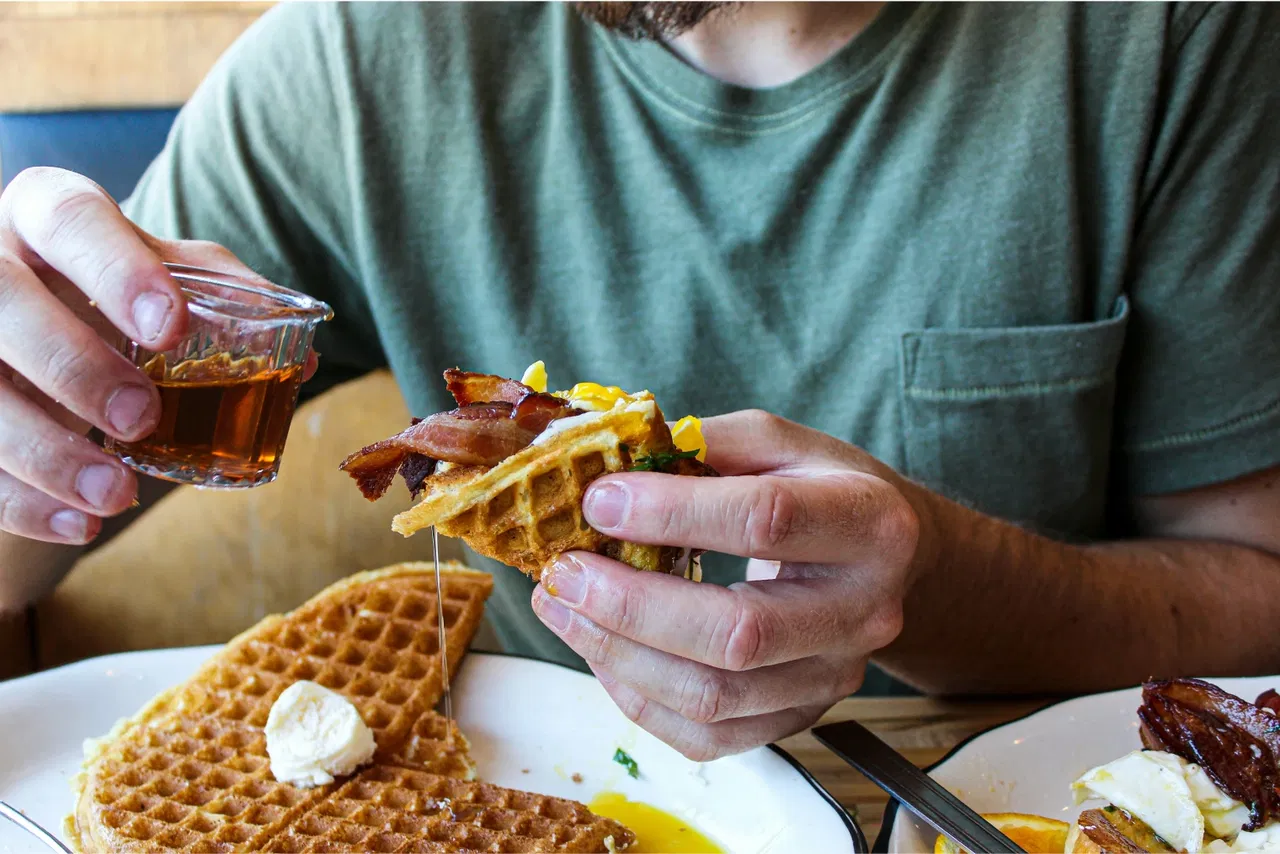
Organic maple syrup claims to offer a cleaner, more sustainable pour. Yet many wonder if it genuinely surpasses the standard variety. This deep dive examines the differences in production, nutritional impact, and taste. Gain clarity on which syrup option suits your pantry—whether you crave better flavour, ethical sourcing, or health-related benefits.
Understanding the Organic vs Regular Maple Syrup Debate
Consumers searching “Is organic maple syrup better than regular maple syrup?” often seek
informational insights before making a purchase. They want to understand nutritional distinctions, production standards, and whether paying more for the organic label is worthwhile.
This article will address those questions directly and go beyond surface-level facts to offer actionable advice.
By answering the core query and exploring related topics such as where to buy pure organic maple syrup online and whether sugar can be replaced with maple syrup in baking, this post helps readers make well-informed decisions that align with their health and sustainability goals.
What Qualifies Maple Syrup as ‘Organic’?
Organic maple syrup follows rigorous standards set by organizations like the USDA in the United States. To earn the “organic” label, producers must:
Avoid synthetic chemicals, pesticides, or fertilizers in the maple forest (sugar bush).
Maintain healthy soil and forest management practices to protect biodiversity.
Preserve ecological integrity, ensuring minimal impact on local wildlife.
Pass regular inspections verifying that each step meets organic regulations.
These methods cultivate a more natural environment and uphold sustainable tapping processes. Because the sap is collected in ways that preserve the maple trees’ health, consumers often appreciate the eco-conscious approach behind certified organic syrup.
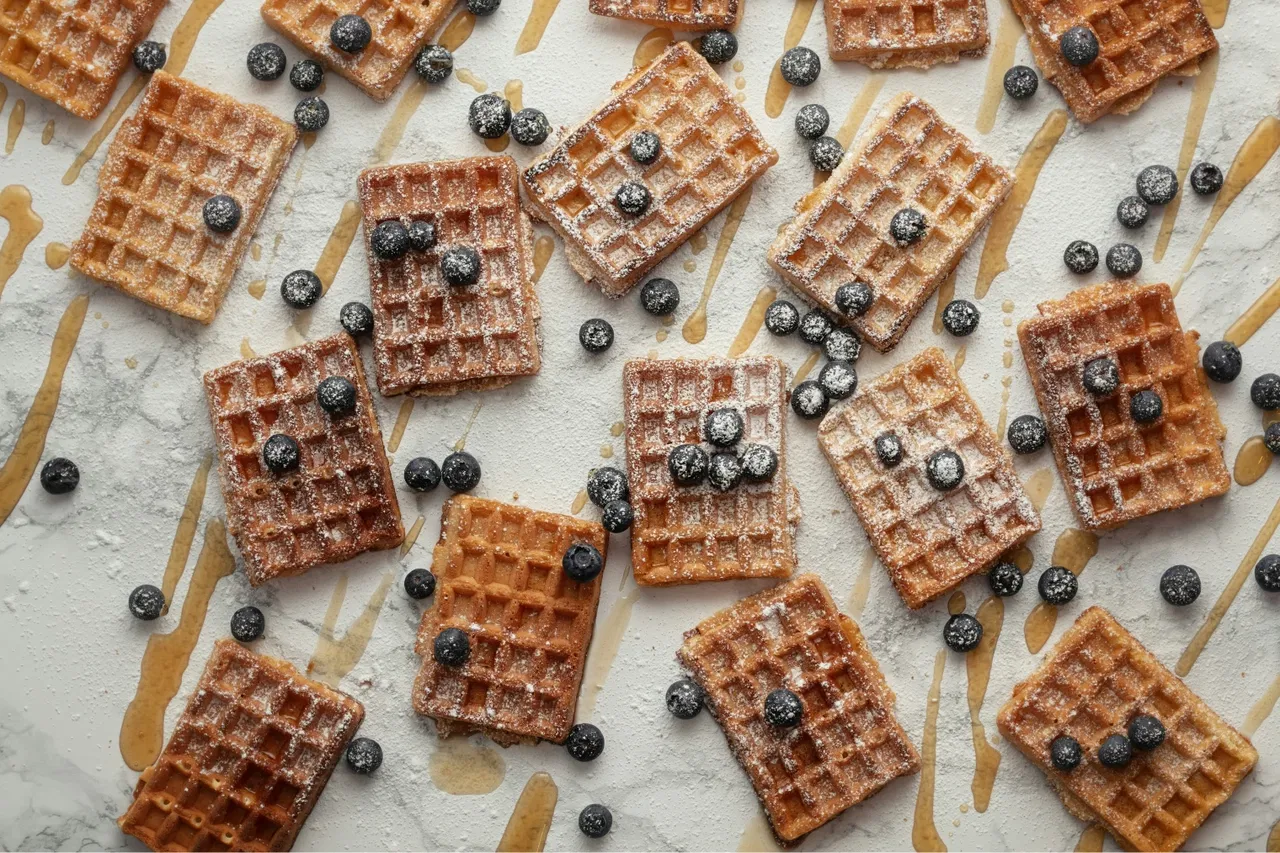
Waffles Covered in Maple Syrup and Blueberries on Marble Table.
It's important to note that organic certification also extends beyond the forest itself. The entire production process, including sap collection, filtering, and bottling, must adhere to organic standards. This means that any equipment used, such as food-grade tubing or evaporators, must be free from prohibited substances and cleaned using only approved methods. Additionally, organic producers often implement energy-efficient practices and may use renewable energy sources in their sugarhouses. This comprehensive approach to organic production ensures that from tree to table, organic maple syrup maintains its integrity and aligns with environmentally conscious values.
Regular Maple Syrup Explained
Regular, or conventional, maple syrup still adheres to basic safety standards. It is not necessarily riddled with chemicals. However, the difference lies in how producers might use non-organic defoaming agents, fertilizers, and pesticides in managing their sugar bushes. Oversight is usually less stringent than with organic operations.
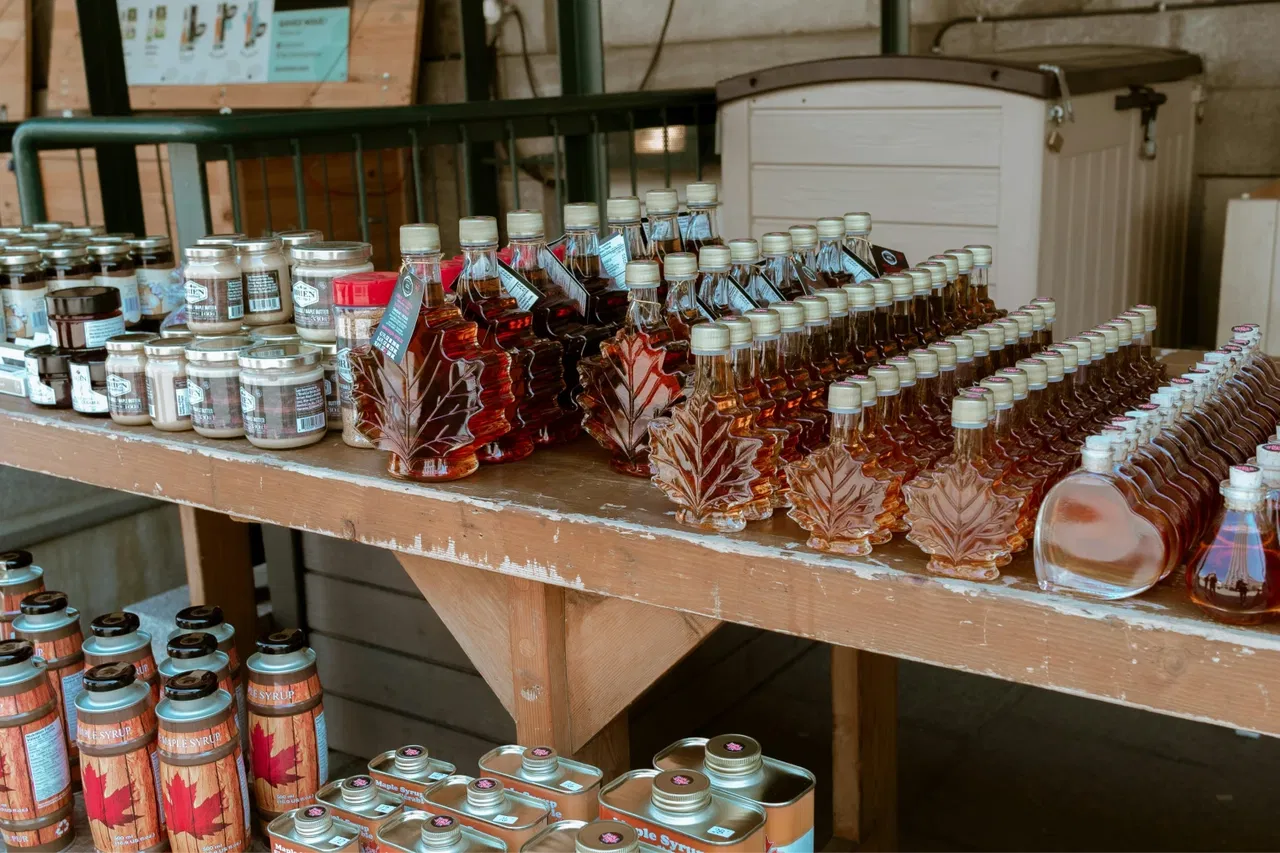
Maple Syrup on Counter Display.
Many conventional brands still produce high-quality syrup. Yet, the primary distinction is the
guarantee that organic labels come with: a confirmation of environmentally friendly processes and strict adherence to organic farming laws.
Nutritional and Health Aspects
Both organic and regular maple syrup contain similar core nutrients:
Minerals:
Maple syrup has manganese, zinc, and small amounts of calcium and potassium.
Antioxidants:
Not as high as in fruits or vegetables, but it contains more antioxidants than refined sugar.
Glycemic Index:
Maple syrup has a moderate glycemic index (~54) compared to standard white sugar (~65).
Potential Health Perks
Less Processed:
Even conventional maple syrup undergoes minimal processing compared to heavily refined sweeteners.
No Added Chemicals:
Organic standards aim to prevent contaminants from entering the syrup, potentially leading to a “cleaner” product.
From a nutritional standpoint, the core difference is less about vitamins and minerals and more about the overall purity and farming practices. If you prioritize a product free from synthetic additives, organic may be the better choice.
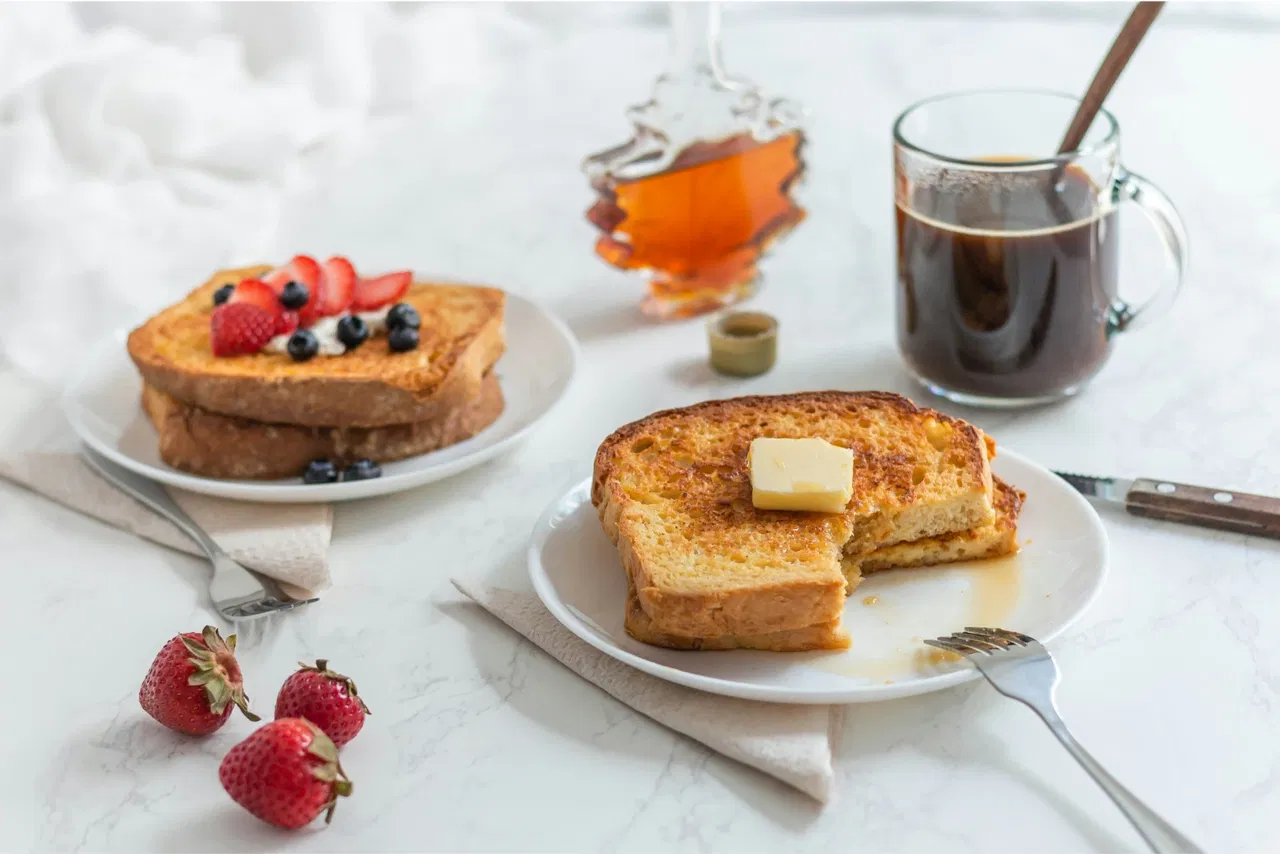
Full Breakfast with Maple Syrup, Coffee, and Toast.
According to the National Institutes of Health, consuming natural sweeteners in moderation can be part of a balanced diet. The key is mindful portion sizes and overall sugar intake, whether it’s organic or not.
Taste, Color, and Grade Differences
Maple syrup grading typically follows colour and flavour intensity, ranging from Golden Delicate to Very Dark Strong:
Golden, Delicate Taste
Amber, Rich Taste
Dark, Robust Taste
Very Dark, Strong Taste
Organic and conventional syrups can exist in these same grades. Taste differences hinge more on
tree variety, climate, and harvest timing than on the organic label. Still, some organic enthusiasts claim a “cleaner,” more nuanced flavour.
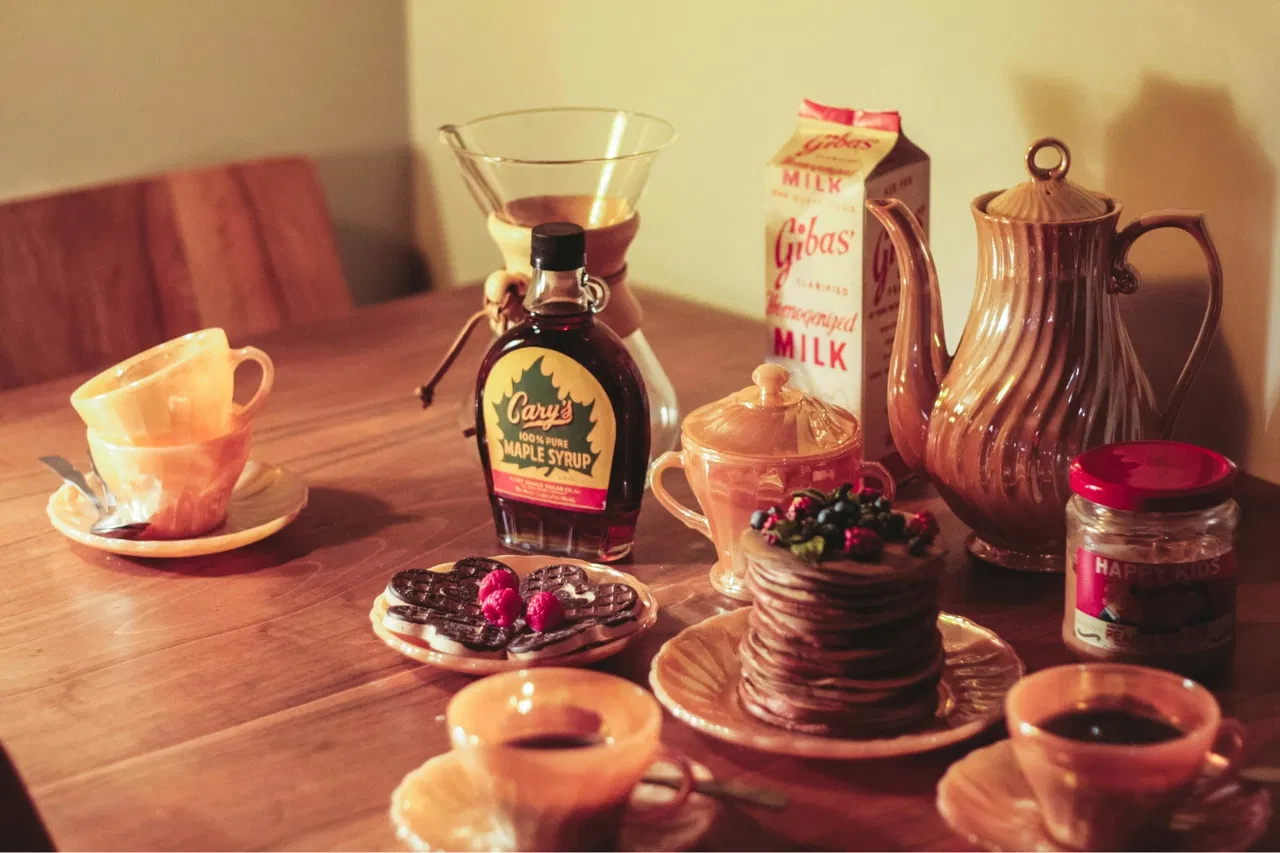
Maple Syrup on Table with Full Breakfast.
It's worth noting that the grading system for maple syrup has been standardized across North America in recent years, making it easier for consumers to understand what they're buying. While the organic label doesn't directly impact the grade, some connoisseurs argue that organic production methods can lead to subtle flavour enhancements. This is because organic practices may result in healthier soil and trees, potentially influencing the sap's composition. However, these differences are often subtle and subjective. Ultimately, the best way to determine your preference is through personal taste tests, comparing organic and conventional syrups within the same grade category.
Where to Buy Pure Organic Maple Syrup Online
One of the biggest questions for eco-minded consumers is where to buy pure organic maple syrup online. Here are four considerations before you click “add to cart”:
Certifications and Labels:
Look for the official USDA Organic seal or equivalent certification in your region.
Transparent Sourcing:
Reputable websites detail where the syrup is tapped. Some even highlight specific farms or cooperatives.
Customer Reviews:
Authentic feedback helps you gauge taste, thickness, and quality.
Bulk Buying or Subscription Deals:
Buying in bulk or setting up a subscription can cut costs and ensure you always have syrup on hand.
Pro Tip: One brand that exemplifies these qualities is Maple Terroir. They offer certified organic maple syrup sourced from family-owned sugar bushes, providing transparency about their harvesting locations and methods. Maple Terroir's products showcase the unique flavours of different maple-producing regions, allowing consumers to experience the subtle taste variations influenced by local soil and climate conditions.
Can You Replace Sugar with Maple Syrup in Baking?
For those reducing refined sugar intake, maple syrup is a popular alternative. Here are some practical considerations:
Adjust Liquid Ratios:
Maple syrup is liquid, so reduce other liquids in the recipe (milk, water) by about 3–4 tablespoons per cup of syrup used.
Lower Oven Temperature:
Maple syrup caramelizes faster, so bake at roughly 25°F lower than you would if using regular sugar.
Flavor Profile:
Maple adds a subtle, earthy sweetness—ideal for breads, cookies, and muffins.
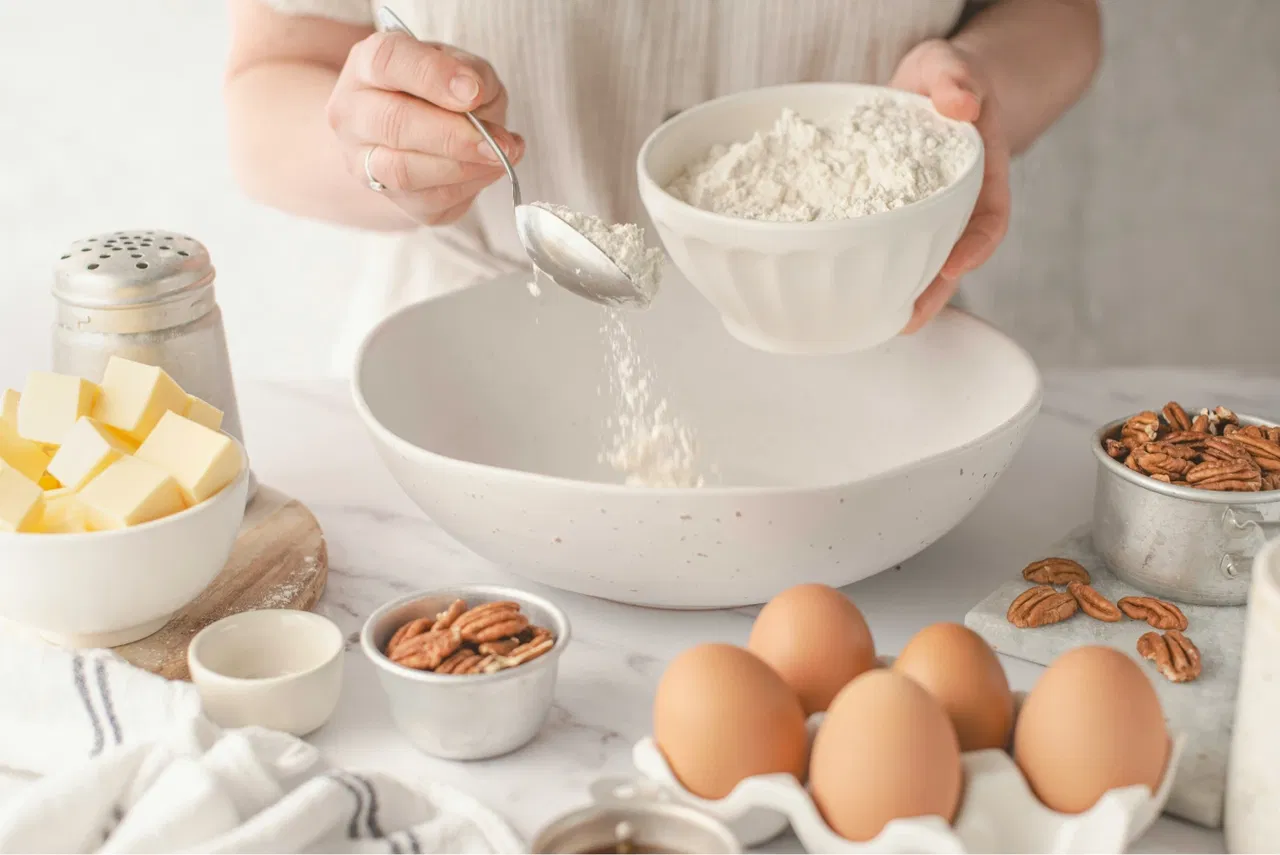
Baking with White Bowls.
While not an exact 1:1 substitute for all recipes, it works well for many desserts. This means you can enjoy delicious baked goods with potentially fewer chemicals and a different nutritional profile. Combined with the moderate glycemic index, it offers an appealing choice for those aiming to maintain balanced eating habits.
E-E-A-T: Industry Experts, Hands-On Experience, and Trust
Experience
Having personally visited several family-run sugar bushes in Vermont, I’ve observed how organic and conventional producers manage their forests. Organic-certified farms often use natural methods to prevent pests and ensure their trees remain healthy for generations.
Expertise
As a culinary writer with extensive research on natural sweeteners, I’ve tested organic maple syrup in various recipes and consulted with nutritionists for professional guidance on sugar substitutes.
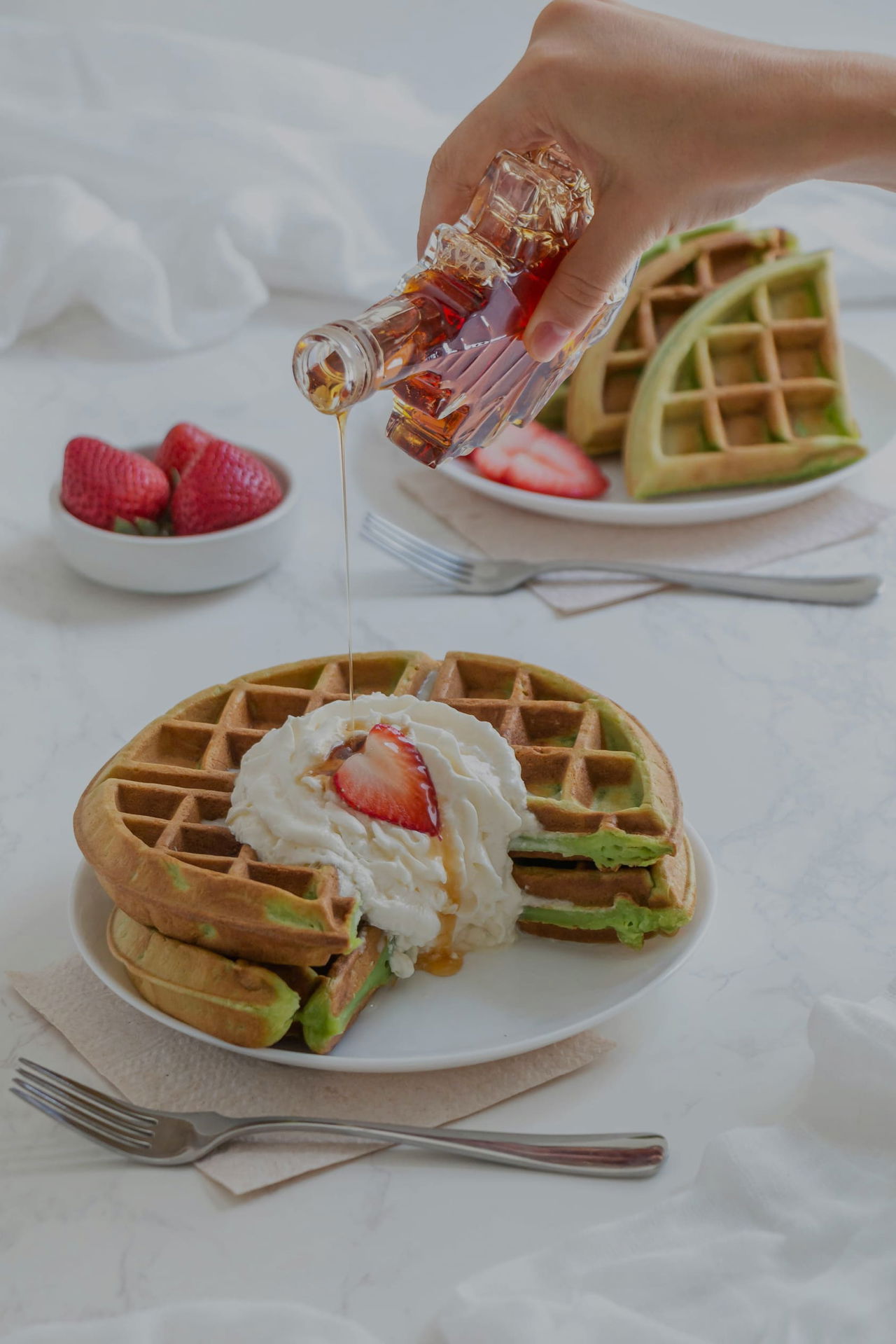
Maple Syrup Being Poured onto Matcha Waffel.
Authoritativeness
This guide references leading authorities like the USDA and NIH to confirm best practices and inform you with credible data. Transparent labelling and recognized certifications underscore the authenticity of the organic label.
Trustworthiness
All statements aim to remain accurate and balanced. The potential benefits of organic maple syrup come with a reminder to consume sweeteners in moderation. If you have specific health concerns, consult a qualified professional.
FAQ
1. Does organic maple syrup have fewer calories than regular maple syrup?
No. Organic and regular maple syrup have similar calorie counts—approximately 50–52 calories per tablespoon. The main difference lies in farming practices and potential trace chemicals, not caloric content.
2. Is Grade A maple syrup always organic?
Not necessarily. Grade A refers to colour and taste profiles. Syrup labelled as Grade A can be organic or conventional. Look for the USDA Organic seal to confirm.
3. Is organic maple syrup worth the higher price?
For those prioritizing eco-friendly farming, reduced chemical exposure, and transparent sourcing, organic maple syrup can be worth the extra cost. The final choice depends on personal preferences and budget.
4. Can I store organic maple syrup at room temperature?
Unopened syrup can be stored at room temperature. After opening, keep it refrigerated to preserve taste and prevent spoilage.
5. Are there any allergens in maple syrup?
Pure maple syrup, organic or not, is generally free of common allergens. Double-check labels or manufacturing disclaimers if you have specific concerns.
Final Thoughts
Organic maple syrup offers robust assurances around ethical production, environmental stewardship, and potential purity gains. Yet even conventional options can deliver excellent flavour and a range of nutrients. If you prioritize sustainability and cleaner production standards, organic might be a meaningful investment.
For those who simply want great taste at a lower price point, a high-quality conventional syrup could suffice.
Next Steps:
Compare different
organic
brands based on certifications and real customer reviews.
Experiment with maple syrup in your favourite baking or cooking recipes.
Share your experience with friends or on social media to help others find reputable producers.

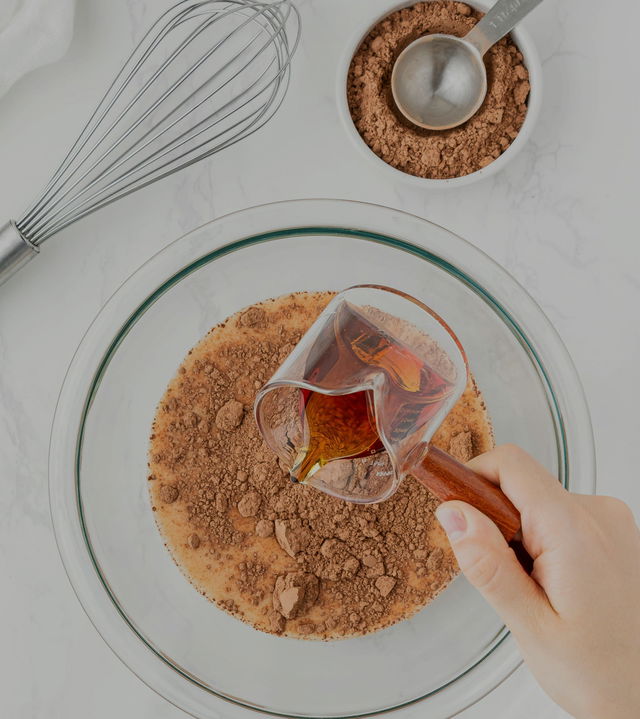
Pure Canadian Sweetness Since 1978
Delivering the finest Canadian maple traditions to tables worldwide for over 47 years.
Shop Now

